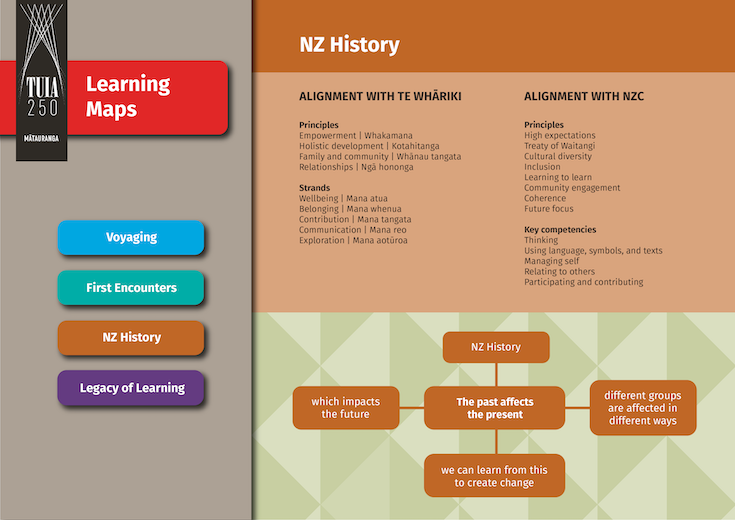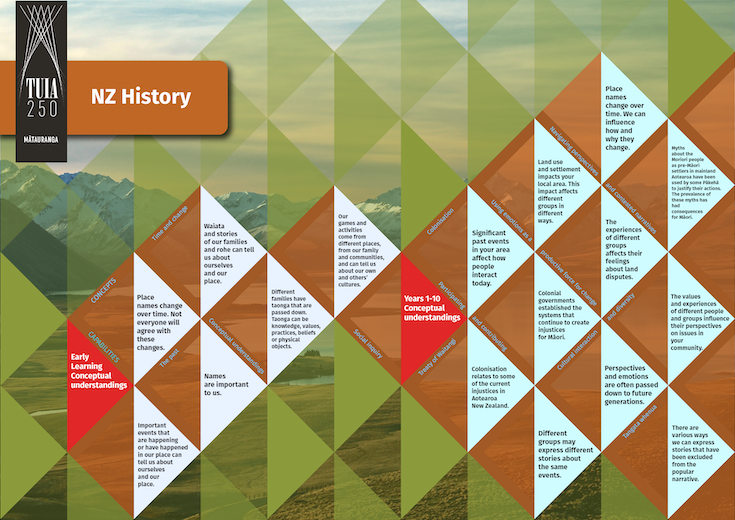New Zealand History
We are preparing to close this site soon as this content has now moved to Tāhūrangi.
Tāhūrangi is the new online curriculum hub for Te Tāhuhu o te Mātauranga | Ministry of Education.
The Tuia Mātauranga themes are designed to be taught separately and are broad enough to be taught at any time. They support robust exploration of New Zealand's histories in local contexts and have value beyond the commemorations. Within this theme New Zealand History theme you will find:
Learning map | Conceptual understandings | Inquiry questions | Teaching and learning guide | Video
Learning map
Download a PDF version:
NZ History learning map.pdf 505 kB
Conceptual understandings
Download a PDF version:
NZ History conceptual understandings.pdf 336 kB
Inquiry questions
- How does colonisation relate to some of the current injustices in Aotearoa New Zealand?
- What were the significant events in your area that have affected how people interact today?
- Did Captain Cook lay the foundation for current systemic injustices towards Māori?
- What effect has land use and settlement had on your local area? What impact has this had on different groups of people?
- How have the experiences of different groups affected their feelings about the Ihumātao issue?
- How are emotions passed down to future generations?
- Why do different groups tell different stories about events?
- What experiences have different people and groups had that may have influenced their perspectives on an issue in your community?
- Why do you think that myths about Moriori, as pre-ceding Māori on mainland New Zealand, have been so prevalent? What purpose do they serve for people who believe them? What consequences does this have for Māori?
- How could stories that have been excluded from the popular narrative be widely told?
- How did the places in your area get their names? Was this fair or unfair? How could you make this fairer?
Download a PDF version:
New Zealand History Years 1-10 inquiry questions.pdf 122 kB
Teaching and Learning Guide
Download the New Zealand History Teaching and Learning Guide:
Tuia Mātauranga – New Zealand History Teaching and Learning Guide.pdf 802 kB
Video
The past affects the present which impacts the future. People have different perceptions of what this means and we can learn from this to create change.
This NZ History video was recorded with students in year 3, year 6 and year 8. The material is not separated by age or stage - teachers are able to use it according to student interest and ability, and relevance to local communities
In this video, students discuss the following inquiry questions:
- How can we influence the world by what we do or buy?
- What cause would you consider protesting for?
- How did the places in your area get their names? Was this fair or unfair? How could you make this fairer?
- How can we protect and use te reo and tikanga?
Note: You may prefer to tell the students the inquiry questions first, allowing them to formulate their own thoughts, before exposing them to the thoughts of others. Or, you may find that watching the video first prompts more discussion.
These videos are very useful for discussions of perspective, bias and values. Ask students to explore:
- Whose story is this?
- Is it about individuals or groups?
- What can influence the way people talk about historical events?
- What other things does this story remind you of?
- What other ways could this story be told?
- What is the difference between fact and interpretation?
- Is history always based on fact?
This video may prompt students to talk to their whānau, and the wider school community about the events portrayed, and the history they know. Students could then tell the historical stories of their own community in animation like this.
Text on screen
Recently, we asked a group of students from Aotearoa to talk about Tuia NZ History. These thoughts and perspectives are their own. Use this video to prompt discussion and explore your own perspectives and values.
How can we influence the world by what we do and buy?
Students’ voices
Well, usually you have signs or you go to big crowds that want to save something or help something.
I think you'd need to get in a group. Or get someone really important that people will listen to. And you know, make a group and you know, speak loud and stand up for what you believe.
Yeah, I’d agree with get someone who has some sort of importance, like an adult. Or a council member. Yeah. People listen to children sometimes but like, sometimes they just kind of think “Oh they're not talking much sense. Yeah, What do they know they're just young.” It’s like, if you have a couple of adults who know what they're talking about, then that could help quite a lot.
Text on screen
You have heard what these learners think. How would you answer this question? Pause this video to explore your perspectives.
What cause would you consider protesting for?
Students’ voices
I would protest about my culture and fighting for it because the Pākeha has been treating us unfairly and been taking a lot of land. 150 years ago they took away the land from the Māori. If it’s just being taken, then they will try to make a lot of money off it which people said is not how New Zealand works.
I would protest for like, stuff that's happening in the environment and stuff that's happening to people that's not fair at all. Like rights that are being ignored.
I think I agree with the environment one. Yeah, I feel quite strongly about the environment.
Text on screen
You have heard what these learners think. How would you answer this question? Pause this video to explore your perspectives.
How did the places in your area get their names?
Was this fair or unfair?
How could you make this fairer?
Students’ voices
Māori was the first culture to get to New Zealand, so they might have been like, all of them were named Māori and then when the Europeans came they might have changed some.
I think it would be hard to change the place names but it would be worth a shot.
Text on screen
How can we protect and use te reo and tikanga?
Students’ voices
We could protect te reo in our school by like, more people joining into like kapa haka and those sorts of things.
Someone can start a petition for like Māori club and it can be like after lunchtimes or something. And people who want to learn a bit more te reo Māori can just go up and start learning.
End titles
Download a PDF version:
Tuia Mātauranga – New Zealand History.pdf 67 kB
Explore other Tuia themes
- First Encounters – the meeting of land and sea, Māori and Aotearoa, Māori and European and the many migrations.
- Voyaging – the 1000 years of Pacific voyaging and celestial navigation, and the meeting of two great voyaging traditions.
- Legacy of Learning – maintaining and building strong respectful relationships, celebrating the rich heritage of all of the people that have chosen to live here, and strengthening our relationship with the environment.



